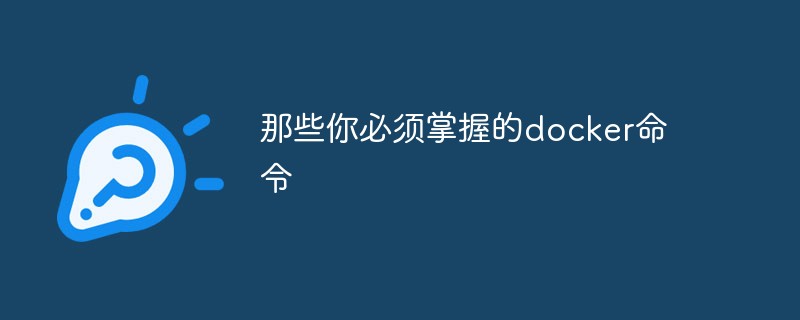Those docker commands you must master

必须掌握的基本命令:
(学习视频分享:编程视频)
docker images 显示所有的镜像
docker rmi image_name 删除镜像
docker build -t tag:version Dockerfile_Directory 生成镜像(Eg:docker build -t runoob/ubuntu:v1 . )
docker tag source_images:version target_images:version 为镜像创建一个新的TAG
docker run --name container_name -d tag:version 运行镜像(以后台进程的形式从镜像生成并启动容器)
-p 5001:5000 : 端口映射 主机端口5001映射到容器端口5000
-v /tmp/data3:/data3:ro :挂载数据卷 数据卷默认的权限时rw
docker login [ip] 登陆Docker镜像仓库,如果未指定镜像仓库地址,默认为官方仓库 Docker Hub
docker push tag:version 将镜像push到镜像仓库(比如harbor,前提是已经登陆过该仓库地址)
docker pull tag:verson 从镜像仓库获取镜像
docker save -o xxx.tar tag:version 导出镜像
docker load --input xxx.tar 导入镜像
docker ps 查看正在运行的容器(相当于docker container ls)
docker ps -a 查看所有的容器(相当于docker container ls --all)
docker create --name container_name tag:version 创建容器
docker rm container_name 删除容器
docker start|stop|restart container_Name/container_Id 启动|关闭|重启容器
docker exec -it container_name bash 进入到容器内部
docker logs -f container_name 打印容器日志
-f:log会即时打印,默认只打印当前日志
--tail=10 :返回最新10条日志
docker stop $(docker ps -q) 停用全部运行中的容器
docker rm $(docker ps -aq) 删除全部容器
docker rm $(docker ps -aq) -force 强制删除全部容器
docker rmi `docker images | grep xxxxx | awk '{print $3}'` 批量删除镜像
docker system df:查看镜像和容器硬盘占用
docker system prune:清理容器内已停止的容器和悬空镜像,未使用的卷和网络,-a 会清空未使用的镜像readlink /var/lib/docker/overlay2/l: invalid argument报错
需要清理镜像
docker system prune
相关推荐:docker教程
The above is the detailed content of Those docker commands you must master. For more information, please follow other related articles on the PHP Chinese website!

Hot AI Tools

Undresser.AI Undress
AI-powered app for creating realistic nude photos

AI Clothes Remover
Online AI tool for removing clothes from photos.

Undress AI Tool
Undress images for free

Clothoff.io
AI clothes remover

Video Face Swap
Swap faces in any video effortlessly with our completely free AI face swap tool!

Hot Article

Hot Tools

Notepad++7.3.1
Easy-to-use and free code editor

SublimeText3 Chinese version
Chinese version, very easy to use

Zend Studio 13.0.1
Powerful PHP integrated development environment

Dreamweaver CS6
Visual web development tools

SublimeText3 Mac version
God-level code editing software (SublimeText3)

Hot Topics
 How to exit the container by docker
Apr 15, 2025 pm 12:15 PM
How to exit the container by docker
Apr 15, 2025 pm 12:15 PM
Four ways to exit Docker container: Use Ctrl D in the container terminal Enter exit command in the container terminal Use docker stop <container_name> Command Use docker kill <container_name> command in the host terminal (force exit)
 How to copy files in docker to outside
Apr 15, 2025 pm 12:12 PM
How to copy files in docker to outside
Apr 15, 2025 pm 12:12 PM
Methods for copying files to external hosts in Docker: Use the docker cp command: Execute docker cp [Options] <Container Path> <Host Path>. Using data volumes: Create a directory on the host, and use the -v parameter to mount the directory into the container when creating the container to achieve bidirectional file synchronization.
 How to check the name of the docker container
Apr 15, 2025 pm 12:21 PM
How to check the name of the docker container
Apr 15, 2025 pm 12:21 PM
You can query the Docker container name by following the steps: List all containers (docker ps). Filter the container list (using the grep command). Gets the container name (located in the "NAMES" column).
 How to restart docker
Apr 15, 2025 pm 12:06 PM
How to restart docker
Apr 15, 2025 pm 12:06 PM
How to restart the Docker container: get the container ID (docker ps); stop the container (docker stop <container_id>); start the container (docker start <container_id>); verify that the restart is successful (docker ps). Other methods: Docker Compose (docker-compose restart) or Docker API (see Docker documentation).
 How to start mysql by docker
Apr 15, 2025 pm 12:09 PM
How to start mysql by docker
Apr 15, 2025 pm 12:09 PM
The process of starting MySQL in Docker consists of the following steps: Pull the MySQL image to create and start the container, set the root user password, and map the port verification connection Create the database and the user grants all permissions to the database
 How to update the image of docker
Apr 15, 2025 pm 12:03 PM
How to update the image of docker
Apr 15, 2025 pm 12:03 PM
The steps to update a Docker image are as follows: Pull the latest image tag New image Delete the old image for a specific tag (optional) Restart the container (if needed)
 How to start containers by docker
Apr 15, 2025 pm 12:27 PM
How to start containers by docker
Apr 15, 2025 pm 12:27 PM
Docker container startup steps: Pull the container image: Run "docker pull [mirror name]". Create a container: Use "docker create [options] [mirror name] [commands and parameters]". Start the container: Execute "docker start [Container name or ID]". Check container status: Verify that the container is running with "docker ps".
 How to create containers for docker
Apr 15, 2025 pm 12:18 PM
How to create containers for docker
Apr 15, 2025 pm 12:18 PM
Create a container in Docker: 1. Pull the image: docker pull [mirror name] 2. Create a container: docker run [Options] [mirror name] [Command] 3. Start the container: docker start [Container name]





